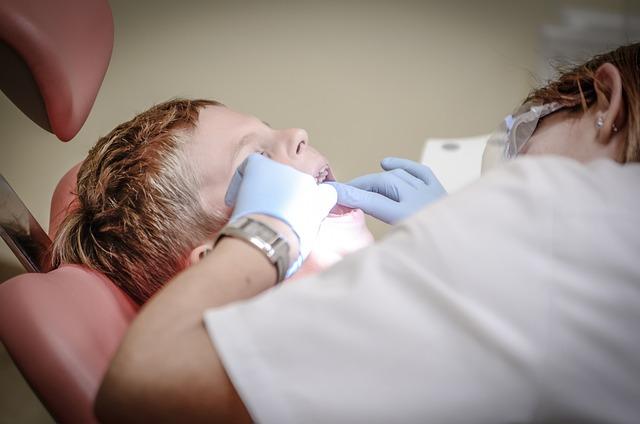What Saltwater Does to Teeth? Dental Effects Explored
Saltwater is the vast expanse that covers more than two-thirds of our planet, teeming with life and holding countless secrets within its depths. While it is a source of wonder and fascination, saltwater can also pose some unexpected challenges, particularly when it comes to our dental health. Yes, you read that right – our teeth can be directly affected by the very substance that sustains marine life. In this article, we will delve into the intriguing world of saltwater’s effects on our teeth, unraveling the mysteries and shedding light on the dental consequences that may arise from our encounters with this powerful force of nature. Prepare to dive into a sea of knowledge as we explore the fascinating dental effects of saltwater.
1. Understanding the Impact: Unveiling the Dental Effects of Saltwater on Teeth
When it comes to the impact of saltwater on teeth, understanding the effects is crucial. Saltwater, although natural, can have both positive and negative effects on dental health. Let’s delve into the dental effects of saltwater:
- Beneficial effects:
- Saline solution: Saltwater acts as a natural saline solution, which can help cleanse the mouth and gums. It can reduce inflammation and promote healing.
- Natural antiseptic: The salt in saltwater possesses antiseptic properties, which can help kill bacteria and prevent infections in the oral cavity.
- Mineral-rich: Saltwater contains essential minerals like calcium and fluoride, which can strengthen tooth enamel and prevent tooth decay.
- Potential risks:
- Excessive salt content: Consuming or rinsing with highly concentrated saltwater can lead to an increased risk of enamel erosion.
- Dehydration: Saltwater can have a dehydrating effect on the mouth, leading to dryness and potential oral health issues.
- High sodium levels: Excessive sodium intake from saltwater can negatively impact overall health, contributing to high blood pressure or other health conditions.
It is important to strike a balance when it comes to using saltwater for dental purposes. Consulting a dental professional will provide personalized guidance and ensure the best approach to maintain optimal oral health.

2. The Hidden Consequences: How Saltwater Affects Dental Health
Saltwater has long been touted for its health benefits, but few people are aware of its potential impact on dental health. While saltwater can provide temporary relief for toothaches and mouth sores, its long-term effects can be detrimental.
One of the hidden consequences of saltwater on dental health is its ability to erode tooth enamel. The high salt content in saltwater can wear down the protective layer of enamel, making teeth more vulnerable to decay and cavities. This erosion can lead to increased tooth sensitivity, pain, and even tooth loss if left untreated.
Additionally, saltwater can disrupt the natural balance of bacteria in the mouth. While some bacteria are beneficial for oral health, excessive saltwater exposure can create an environment that promotes the growth of harmful bacteria. This can increase the risk of gum disease, bad breath, and other oral health issues.
To maintain optimal dental health, it’s important to be mindful of the potential consequences of saltwater. Limiting exposure to saltwater, practicing good oral hygiene, and seeking professional dental care regularly can help mitigate the negative effects and ensure a healthy smile for years to come.

3. Delving into the Depths: Exploring the Dental Impact of Saltwater Exposure
Saltwater exposure can have a significant impact on dental health. It is important to understand the potential effects and take necessary precautions when engaging in activities such as swimming in the ocean or snorkeling. Here are a few key points to consider:
- Erosion of tooth enamel: Prolonged exposure to saltwater can lead to the erosion of tooth enamel, which is the protective outer layer of the teeth. This can weaken the teeth and make them more susceptible to cavities and other dental problems.
- Sensitivity: Saltwater exposure may cause increased tooth sensitivity, making it uncomfortable to consume hot or cold foods and beverages. This sensitivity can persist even after the exposure has ended, so it is important to seek dental care if you experience prolonged discomfort.
- Gum irritation: Saltwater can also irritate the gums, leading to inflammation and potential gum disease. It is crucial to maintain good oral hygiene practices to minimize the risk of gum problems.
To protect your dental health when exposed to saltwater, consider these preventive measures:
- Ensure thorough rinsing: After swimming or engaging in saltwater activities, rinse your mouth with fresh water to remove any salt residue.
- Use fluoride toothpaste: Brushing your teeth twice a day with a fluoride toothpaste can help strengthen tooth enamel and protect against erosion.
- Visit your dentist regularly: Regular dental check-ups and cleanings are essential to monitor and address any potential issues caused by saltwater exposure.
By understanding the dental impact of saltwater exposure and taking appropriate measures, you can maintain optimal oral health even when enjoying activities in the sea.
4. Saltwater vs. Dental Health: Unraveling the Complex Relationship
The relationship between saltwater and dental health is a complex one that has intrigued scientists and researchers for decades. While some studies suggest that saltwater can have a positive impact on oral health, others argue that it may have detrimental effects. Let’s take a closer look at the different aspects of this intricate relationship.
Benefits of saltwater for dental health:
- Anti-inflammatory properties: Saltwater is known for its anti-inflammatory properties, which can help reduce swelling and inflammation in the gums. This can be particularly beneficial for individuals with gum disease or periodontitis.
- Antibacterial effects: Saltwater has natural antibacterial properties that can help kill bacteria in the mouth. This can be helpful in preventing the growth of harmful bacteria that can lead to tooth decay and gum infections.
Potential drawbacks of saltwater for dental health:
- High salt content: Excessive salt intake can lead to dehydration and may have negative effects on overall health. Using saltwater as a mouth rinse too frequently or in high concentrations may have similar effects.
- Potential for enamel erosion: The high salt content in saltwater may have a corrosive effect on tooth enamel over time. This can lead to tooth sensitivity and increased risk of cavities.
It’s important to note that while saltwater can offer certain benefits for dental health, it should not replace regular brushing, flossing, and professional dental care. Consulting with a dentist is always recommended to ensure optimal oral health.
5. Saltwater’s Assault: Unveiling the Detrimental Effects on Teeth
Saltwater’s assault on teeth can have detrimental effects that many people may not be aware of. The high salt content in seawater can cause a range of oral health issues, including:
- Erosion of tooth enamel: The salt in seawater can erode the protective layer of enamel on our teeth, leaving them vulnerable to decay and sensitivity.
- Inflammation of gums: Saltwater can irritate and inflame the gums, leading to gingivitis or even more severe gum diseases if left untreated.
- Increased tooth sensitivity: As the enamel wears away, the underlying dentin becomes exposed, causing heightened sensitivity to hot, cold, and sweet foods.
It is important to note that occasional exposure to saltwater during activities like swimming or surfing is unlikely to cause significant damage. However, individuals who frequently engage in these activities or live in coastal areas should take preventive measures to protect their teeth. This can include rinsing with fresh water after saltwater exposure, using fluoride toothpaste, and visiting a dentist regularly for check-ups and cleanings.
6. Dive into the Details: Understanding the Specific Dental Consequences of Saltwater
When it comes to the specific dental consequences of saltwater, it is essential to understand the potential impacts it can have on your oral health. Here are some important details to consider:
- Enamel Erosion: Saltwater can be highly corrosive to tooth enamel due to its high salt content. Overexposure to saltwater can gradually erode the protective layer of enamel, leaving teeth vulnerable to sensitivity, decay, and discoloration.
- Gum Irritation: The salt in seawater can cause irritation and inflammation in the gums, leading to discomfort, swelling, and bleeding. Prolonged exposure to saltwater may even contribute to gum disease if proper oral hygiene practices are not maintained.
- Mineral Imbalance: Saltwater contains various minerals that can disrupt the natural balance in the mouth. Excessive exposure to these minerals can alter the pH levels and create an environment conducive to bacterial growth, potentially leading to cavities and other dental issues.
While occasional contact with saltwater during swimming or other activities is generally harmless, it is crucial to rinse your mouth thoroughly with fresh water afterward to minimize the potential negative effects. Additionally, maintaining a diligent oral hygiene routine, including brushing twice a day with fluoride toothpaste and flossing daily, can help protect your teeth and gums from any saltwater-related consequences.
7. Tides of Trouble: How Saltwater Erodes Dental Enamel
When it comes to dental health, one of the major culprits causing trouble is saltwater erosion on dental enamel. This natural process occurs when the enamel, the protective outer layer of the teeth, is gradually worn away by exposure to saltwater. Understanding the impact of saltwater erosion on dental enamel is crucial in maintaining optimal oral health.
Effects of Saltwater Erosion:
- Gradual loss of dental enamel, leading to tooth sensitivity and increased risk of cavities.
- Weakening of the teeth, making them more susceptible to fractures and chips.
- Discoloration and dullness of the teeth, as the erosion exposes the underlying dentin.
Causes of Saltwater Erosion:
- Consumption of acidic foods and beverages, such as citrus fruits, sodas, and sports drinks.
- Frequent exposure to saltwater through activities like swimming in the ocean or participating in water sports.
- Medical conditions, such as acid reflux or bulimia, which increase acidity in the mouth.
Preventing saltwater erosion on dental enamel involves adopting good oral hygiene practices and making informed choices about lifestyle and diet. Regular brushing with a soft-bristled toothbrush, using fluoride toothpaste, and rinsing with a mouthwash can help protect dental enamel. Additionally, minimizing consumption of acidic foods and beverages, and rinsing the mouth with water after swimming in saltwater, can also contribute to better dental health.
8. Beyond the Surface: The Deep-Rooted Damage of Saltwater on Teeth
When it comes to the impact of saltwater on teeth, the damage runs much deeper than what meets the eye. While many people may associate saltwater with a refreshing rinse or a day at the beach, it’s important to understand the potential harm it can cause to our oral health.
Here are a few key points to consider:
- Erosion: Saltwater contains high levels of salt, which can contribute to the erosion of tooth enamel over time. This erosion weakens the protective layer of our teeth, making them more susceptible to cavities, sensitivity, and decay.
- Dehydration: Saltwater can have a drying effect on our mouth, leading to reduced saliva production. Saliva plays a crucial role in maintaining oral health by neutralizing acids, washing away food particles, and preventing bacterial growth. Without sufficient saliva, the risk of tooth decay and gum disease increases.
- Gingivitis: The salt in saltwater can irritate the gums, causing inflammation and swelling. This can lead to gingivitis, the early stage of gum disease. If left untreated, gingivitis can progress to more serious conditions such as periodontitis, which can result in tooth loss.
While saltwater may seem harmless, it’s important to be aware of the potential damage it can cause to our teeth and overall oral health. Taking preventive measures such as rinsing with fresh water after swimming in saltwater and maintaining a good oral hygiene routine can help mitigate these risks.
9. Protecting Your Pearly Whites: Tips to Safeguard Teeth from Saltwater Effects
When it comes to safeguarding your teeth from saltwater effects, there are a few key tips to keep in mind. By following these simple guidelines, you can help maintain the health and appearance of your pearly whites:
- Stay hydrated: Drinking plenty of water is crucial in preventing dry mouth, a condition that can lead to tooth decay. Hydration also helps flush away harmful bacteria and keeps your mouth clean.
- Rinse after swimming: After a dip in the saltwater, it’s essential to rinse your mouth with fresh water. This helps remove any lingering saltwater that can contribute to enamel erosion.
- Use fluoride toothpaste: Opt for toothpaste that contains fluoride, as it helps strengthen your tooth enamel and protects against tooth decay caused by saltwater exposure.
- Maintain a balanced diet: Consuming a balanced diet rich in vitamins and minerals is beneficial for your overall oral health. Foods like dairy products, leafy greens, and lean proteins help promote strong teeth and gums.
- Visit your dentist regularly: Regular dental check-ups are crucial in detecting any potential issues early on. Your dentist can provide professional cleanings, offer personalized advice, and address any concerns related to saltwater effects.
By incorporating these tips into your routine, you can protect your teeth from the potential negative effects of saltwater exposure and maintain a healthy, beautiful smile.
10. Navigating the Sea of Dental Concerns: Expert Insights on Saltwater’s Impact
In this section, we will delve into the expert insights on how saltwater impacts dental health and address common concerns related to this topic. Here, you will find valuable information to navigate the sea of dental concerns associated with saltwater exposure.
1. Effects of saltwater on teeth:
- Saltwater can help to naturally cleanse the oral cavity by removing debris and reducing bacteria levels.
- However, excessive exposure to saltwater can lead to enamel erosion, as salt can be abrasive and wear down the protective layer of the teeth.
- It is essential to strike a balance and maintain oral hygiene practices to prevent any adverse effects.
2. Saltwater rinses for dental care:
- Saltwater rinses can be an effective home remedy for soothing mouth sores, reducing inflammation, and aiding in the healing process.
- To prepare a saltwater rinse, dissolve half a teaspoon of salt in a cup of warm water and swish it around your mouth for 30 seconds, then spit it out.
- Remember not to use saltwater rinses excessively, as prolonged exposure may cause unwanted side effects.
3. Professional advice is crucial:
- While saltwater can have some beneficial effects on dental health, it is essential to consult a dental professional for personalized advice and guidance.
- Your dentist can assess your specific needs and provide tailored recommendations to maintain optimal oral health.
- Remember, regular dental check-ups and professional cleanings are key to preventing and addressing any potential dental concerns.
By understanding the impact of saltwater on dental health and incorporating expert insights, you can confidently navigate these concerns and ensure the well-being of your oral cavity.
Frequently Asked Questions
Q: What are the dental effects of saltwater on teeth?
A: Saltwater can have several dental effects, including erosion, demineralization, and increased tooth sensitivity.
Q: How does saltwater cause erosion of teeth?
A: Saltwater contains high levels of salt, which is abrasive and can wear down the enamel, the protective outer layer of teeth. This erosion can lead to tooth sensitivity and an increased risk of cavities.
Q: What is demineralization and how does saltwater contribute to it?
A: Demineralization is the loss of essential minerals, such as calcium and phosphate, from the tooth enamel. Saltwater can contribute to demineralization by creating an acidic environment that weakens the enamel, making teeth more susceptible to decay and damage.
Q: Can saltwater make teeth more sensitive?
A: Yes, exposure to saltwater can increase tooth sensitivity. The erosion caused by saltwater can expose the sensitive dentin layer beneath the enamel, leading to heightened sensitivity to hot, cold, sweet, or acidic foods and drinks.
Q: Are there any benefits of saltwater for oral health?
A: While saltwater may have some limited benefits, such as temporary relief for certain oral conditions like gum inflammation or canker sores, its long-term use or frequent exposure can have detrimental effects on teeth.
Q: How can one protect their teeth from saltwater damage?
A: To protect teeth from saltwater damage, it is recommended to avoid prolonged exposure to saltwater and rinse the mouth thoroughly with fresh water after swimming in the ocean. It is also crucial to maintain a good oral hygiene routine, including regular brushing with a fluoride toothpaste and visiting a dentist for check-ups.
Q: Can a saltwater rinse be used as a substitute for regular oral hygiene practices?
A: No, a saltwater rinse should not be used as a substitute for regular oral hygiene practices. While it may provide temporary relief for some oral conditions, it does not replace the effectiveness of brushing, flossing, and regular dental visits in maintaining optimal oral health.
Q: Are there any alternative ways to enjoy saltwater without harming teeth?
A: If you enjoy activities such as swimming or surfing in saltwater, it is best to take preventive measures to minimize the potential harm to your teeth. Using a mouthguard can provide a protective barrier between your teeth and the saltwater, reducing the direct contact and potential damage.
Q: Can saltwater damage be reversed?
A: Some mild saltwater damage, such as enamel erosion or tooth sensitivity, can potentially be reversed or mitigated through professional dental treatments. However, it is essential to seek advice from a dentist to determine the best course of action based on the individual’s specific dental condition.
Q: Is it necessary to consult a dentist if experiencing saltwater-related dental issues?
A: Yes, it is advisable to consult a dentist if you are experiencing any saltwater-related dental issues. A dentist can assess the extent of the damage, provide appropriate treatment, and offer guidance on how to prevent further damage in the future.
In Conclusion
In conclusion, the dental effects of saltwater on our teeth are worth exploring. We have discovered that saltwater, while often considered a natural remedy for oral health, can actually have detrimental effects on our teeth if not used with caution.
Key Takeaways:
1. Saltwater rinses can help promote oral health by reducing inflammation and fighting bacteria.
2. However, excessive exposure to saltwater can lead to enamel erosion and tooth sensitivity.
3. It is crucial to maintain a balanced approach when using saltwater as a dental remedy, ensuring it is not overly concentrated or used too frequently.
4. Regular dental check-ups and professional cleanings are essential to monitor and address any potential damage caused by saltwater or other factors.
5. Consulting with a dentist is highly recommended before incorporating saltwater rinses into your oral hygiene routine, especially if you have pre-existing dental conditions or concerns.
By understanding the potential dental effects of saltwater, we can make informed choices to maintain optimal oral health. Remember, moderation and professional guidance are key when it comes to utilizing natural remedies for our teeth.






